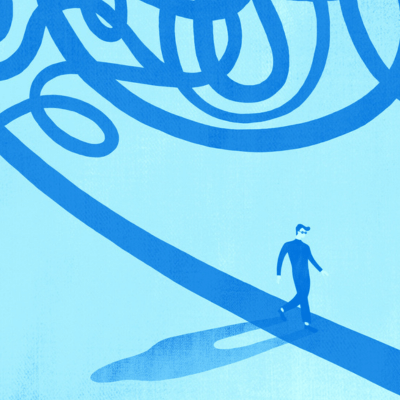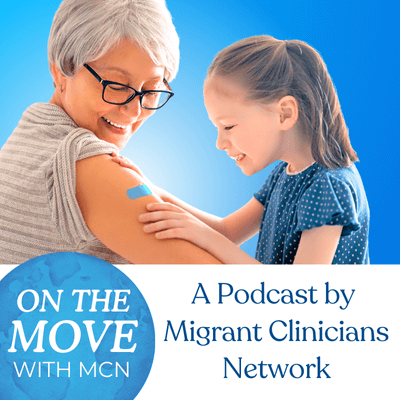Norma Gonzalez: Lending a Hand to Migrants in Need through Health Network

[Editor’s Note: Our Health Network Associates save lives, every week. They provide critical, hands-on case management for migrants and asylum seekers who have ongoing health needs and may otherwise be unable to access care during their migration. Here, we provide a glimpse into the life and work of one Health Network Associate, Norma Gonzalez. This interview has been edited for brevity. Read other Associates’ stories: Enedelia, Saul, Alma, Robert, and Nestor.]
“When she started, she got a very difficult case, which at first, we all thought was going to be a very easy case, and she tackled it like a pro. I think after that case, every other case was very easy for her. Her perseverance with that case showed how caring she is and how she will not take a 'NO' for an answer.”
– Alma Colmenero
“She is a go getter. She is my go-to person when I am having issues with a health center because she fights and fights for our patients and makes sure they get the care they are needing.” – Nestor Reyes
Norma Gonzalez has been with Migrant Clinicians Network for four years, handling countless cases in that time, providing vital care for those who need it most. Recently we had the opportunity to talk with Norma about her life and the path that brought her to MCN. As the daughter of a migrant farmworker who came to work in the US from Mexico through the Bracero program, and as an immigrant herself, her work with Health Network has a personal connection. She brings that history and her values into the case management she provides for migrant patients.
Tell me a little bit about your childhood. When did you come to the United States?
I was born in Sonora, Mexico. By the age of 11, we moved to the United States. We lived on the border of San Luis, AZ, so when we crossed to the United States, I started 7th grade in San Luis, AZ.
Were you bilingual before you came to the United States?
No, it was really difficult. I really got my fluency when I was ending high school and I was completely confident in speaking English when I was in college. I was forced to talk to my teachers, and they were non-Spanish speakers. It had to be English or you're not going to get your grades.
I was shy too. I would always have my friend next to me and say, “Hey, can you ask them this or that?” The older you are when you learn a new language, the more you have an accent too, so I was really pushing myself down because I didn't want people to laugh about my accent.
So, you had a lot of help from your fellow students?
Yes, and the thing is that here in San Luis, when I came all my teachers would speak Spanish. It was no help for me [in learning English]. I was comfortable because all my teachers, my classmates, everyone would speak Spanish. And then, when it came to high school, it got a little bit harder.
Did you go to college after high school?
Yes, I went to the community college. It's called Arizona Western College and I got my Associate’s in applied science. I graduated with a massage therapy degree. I was a tech working for many years in physical therapy. And I was planning to go back for a PTA [to become a physical therapist assistant], but it's hard getting into the program. I'm working now and I’ll see if there are some other options other than PTA.
That makes sense. So how did that transition to MCN?
I was living in Yuma, AZ. I got married in 2018 and moved to Texas with my husband, Victor. I wasn't working for almost a year, probably 10 months, and I was stressed because I'm so used to working and not being at home full time. So, I started looking for jobs. I got a job as a tech at a physical therapy clinic.
But the times didn't match with my kids’ school, so I had to look for another job. I ended up with a chiropractor, helping them. But since my massage license is only qualified in Arizona, I couldn't work as a massage therapist. I had a lot of offers at a lot of spas and everything. But since my license is just in Arizona, I was just going for jobs that let me use my experience as a tech. I got into a job with another PT, but it was hard, and they wanted me to do more than a tech with the same salary.
And so, I went on Indeed and MCN came up. [The job was for someone who is] bilingual and it's close to me. And since my parents are immigrants, I know what it is like. I just gave it a shot and applied! They called me, and I went in for an interview. Alma and Rob interviewed me.
When you go into an interview, it's always nerve wracking. It's always like, what if they don't like you, what if they ask you something you don't know? I'm always getting nervous. But it was cool once they started speaking Spanish and I was like, yeah, I'm fluent! I lived on the border, like five minutes away from my house.
It was just like an understanding. Everything we do, my family and I have been through. I came from an immigrant family. My dad still works in the field. He's a bus driver. I know what it means when my dad has to move to California to work for eight months. I identify with the patients. Scheduling my mom's appointments, receiving calls. I’ve already done that. Working as a tech, you know, I learned how to explain things to patients and work with them. I’m so used to working face to face with people and now being behind a computer, it was just the complete opposite, so it was difficult for me. But I don't know, I wanted to give it a shot and I really like it. I started working for MCN in October of 2019.

You said you got married in 2018. Tell me a bit about your family.
Yes, and I have a boy and a stepdaughter. My son is 14 and my daughter's 12. Right now, since I moved back to Arizona, I'm working fully from home. But when I was in Texas before COVID, I was going to the office every day. It was great because I would drop my kids at school at 7 and then by 7:30 I was at work. I could leave work around 3 – 3:15 so I could pick up my kids and then finish my day.
The schedule worked perfectly and whenever there was a vacation, I would just bring my kids to Arizona to stay with their grandmas. My daughter will stay with my mother-in-law and my son will stay with my mom, and then we just come and pick them up later. They really enjoy just being with their grandmas.
I also have a sister and four brothers, we're a huge family.
Were all of you able to pursue an education in the States?
Yes, my sister, my only sister, she's a police officer. My brother got married very young as well, so he just quit his college. He works as a truck driver. And then I had a younger brother, but we lost him in 2017. He was the smartest out of all of us. And then the two youngest, they’re 19. They're twins and they’re both in school.
I'm sorry for your loss. I wanted to ask if there are any specific cases you've worked on with your time and Health Network that really stick out as an “I'm doing the right thing moment.”
I had this case where the mom, I don't know if she was from Mexico or Guatemala, they came into the US, and I started working with them. Her kid had a lot of medical issues. He had cerebral palsy and a lot of other things going on. The mom was really attached to me. She would ask me about everything, and I would follow up with her. So, the first thing we needed to do was get a pediatrician for him so they can refer to specialists. He had a lot of seizures. Like 40 seizures in a day, it was that bad. No medication would help him at all.
The mom was really concerned, and she was a young mom. She was like 23 or 24 years old and the kid was six or seven years old. I got them into a program; it was kind of a daycare therapy where they take care of the kid, but they will give him therapy. It was time for him to go to school, so they wanted to have him engaged in some type of activity, even though he had all of these things going on. So, the mom has time to either work or take care of the other kids and then he's not just at home.
But she didn't want me to close the case because if something happened, what would she do without me? There are a lot of programs that people don’t know about. At Health Network, we search, we call the clinics, we try everything just to try to help them -- and it's not just medical care. But we mainly focus on medical care, and I was able to find that for him.
They don't have any immigration status, but he was able to get all this help. And then Del and Laz told me that it was time for me to let them go because I would call them and talk to them every day, just to make sure everything was fine, the medications, if he didn't get any infection or anything. But it was, it was a really, really good case knowing that the mom was able to get the help that they needed for this kid.
You mentioned at one point having a case that was not so easy. I’m curious about that.
Yes, we had this prenatal patient. She was almost 40 years old. She was already considered a high-risk pregnancy. She was in one of the states where we have a lot of trouble getting our prenatal patients into care. She had this condition called Deep Vein Thrombosis (DVT). She had this clotting on her legs that she needed to be on medication for, because she could have a blood clot going somewhere and she could die. We had to find her a clinic and then a hospital and everything for her care.
But she was reluctant to pay anything. We found a program where the medication would cost like four to seven bucks for the full three weeks, or a month supply, and she refused it because she didn't want to pay anything. It was really, really, really hard for us to try to get this patient to understand the severity of her condition. She had had the baby, but she still has that condition.
She wouldn't listen to us. She wanted it free. It's hard because some people came with the idea that once they come here, everything be free. And then to change their mind is hard.
But she just didn't want to pay. Not even five or six dollars to get the medication. We explained to her that she couldn't get pregnant again because she could literally die, and she was reluctant. It was hard working on this.
This case was draining because, you know, you can help them. She has the help in her hands. She just didn't want to do it because she wanted it for free.
I want to also just ask a couple non-work-related questions. What's your ideal weekend?
Well, I'm also a massage therapist. I work on Saturdays. I help one of my friends. She has a spa. I started working probably three months ago, and I just go on Saturday mornings. I’ll go to work and finish around 1:00 or 1:30ish. Then I come home. My kids don’t like to be home, so if my husband's around, we just go and have lunch or dinner or just go to Starbucks. That’s my go-to place, sitting in Starbucks and just having my coffee with my husband. Sometimes we go to Mexico and just have dinner there and then just come back.
You mentioned having some family in Mexico. Do you see them often?
We did, but since my grandparents passed away, we don’t go as much anymore because we would go and visit my grandparents and then everyone would show up. Unless [a relative is] having a birthday party, we will go, but we don’t visit them regularly, you know? Just for special occasions.
You mentioned that your kids are just starting their teenage years, right?
Yes. My son has a few challenges, but he's getting there. He has hearing problems that we just uncovered, so he's been falling behind in school. Once we got the hearing aids, he started advancing. He’s getting better. He's doing good so far. It's his first year in high school.
My daughter, she's a really smart girl. And we have no problems with her. School-wise, she's really good. I don't have any trouble or problems with them.

I would love to hear a little more about your parents, the process of migrating and your dad's work as a farmworker.
Well, my dad said he started working in the field when he was 17 and he’s 56, so it's been almost 40 years working in the fields.
My grandpa was a Bracero, they’re from Guadalajara. They would cross to work in the fields, going to California and then come back, and the whole family was like that. My parents got married very early. My mom was 18, my dad was 20. They had me when my mom was 21.
My dad decided that for us to get a better life, we have to cross and have a better education here. And because there's more work, there should be more possibilities for us. He got the paperwork and then we had to go to Ciudad Juarez to get our papers done. And then we came here. My dad continued working in the fields. He worked for so many years. He would change positions back in forth. He got his driver’s license for buses, so for many years he was working as a bus driver for the field workers. Here everything was seasonal, he would work from November until March and the other months he either had to go to California or he would have to go on unemployment and work around here to get more money.
My parents are still married. They’re still together. That's a good thing for us and my mom still lives in the same house since we came in 2001. It was kind of rough because we didn't have money, but we had my mom and my dad. We had food and we had clothes and then we had our house. We lived happily even though we didn't have a lot of things, but because we had those major things we were happy.
Did all your siblings stick around that same area of Arizona or have they spread out?
Yes. We're still here and every Sunday, well, most of them, we go to my mom's house and make carne asada or pollo and everything. It's a thing for us trying to get either Saturday or Sunday with my mom. Everyone. It's coming to my mom's on the weekend just to be together. We have each other. Like my mom is my neighbor and my brother is my mom's neighbor, so we all live on the same street, just in different houses.
I'm sure that was a good part about coming back from Texas.
Yes. We didn't have anybody. My aunt would call me, like, “Ohh, did you make friends yet?” And I was like “No, I'm just talking to the walls because I don't know anybody,” before I started working. I started working so I can start socializing and talking to people… Not just watch TV or do dishes. My husband would work. My kids would go to school. So, I was alone and in my house all day. I don't know how I lasted for almost 10 months without working, it was horrible.
When I was in Austin before COVID, we had the office. I had Alma, Nestor, Rob. Everyone was in the office, even Josie who was one of the last ones that got hired before COVID. We had everyone there and when we got mentally tired, we'd all take a walk. Everyone, even Karen would walk with us. It was really fun. And I did make them some food before COVID. I was breaking the ice with MCN in the office when I COVID hit, so they had only tried my pozole and some other small things that I like to cook. It makes it a little harder to work from home instead of being in the office, even though we do the same thing. It's just in the office, you get to get out of your house. I think my house is the problem.
- Log in to post comments






